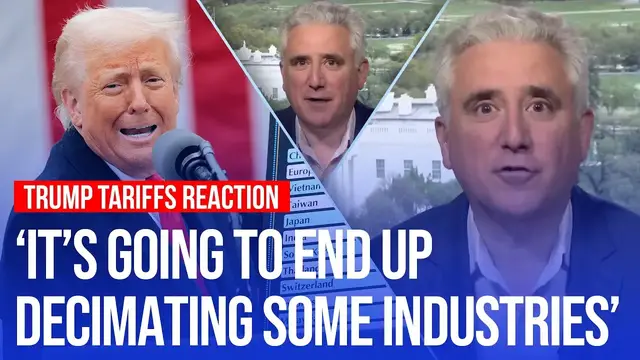0:00
First of all, let's go live to Washington, D.C.
0:01
check in with Simon Marks, LPC's Washington correspondent. Simon, we were chatting this time last night, you and I
0:07
about what we might hear from Donald Trump. Now we know a really historic evening
0:13
Yes, absolutely, an historic evening. There's no question about that, Ben. I think we still don't fully understand a lot about some of these tariffs, however
0:22
because as you saw at that event, President Trump clutching that enormous poster board
0:28
that had some of the tariffs listed. The White House has now put out a full list of them
0:34
And yet the numbers contained on those handouts don't necessarily reflect reality
0:42
For example, he announced a 34% tariff on China. In fact, it's a 54% tariff on China
0:51
according to the White House Press Secretary Caroline Levitt, who is now arguing that it's another 34% on top of the existing tariffs that President Biden and President Trump had previously announced of 20%
1:05
So, in fact, the tariff on China looks like, according to White House officials, it's 54%
1:12
We heard President Trump using some quite dramatic and at times almost violent language
1:18
where he talked about the rape of America by friend and foe alike
1:24
He said in many cases, the friend is worse than the foe in terms of trade
1:29
And we're certainly seeing that in some of the numbers of the tariffs that he's planning to impose
1:34
Of course, 20 percent on the European Union, substantial tariffs on Japan, on South Korea
1:39
I mean, he's going to be absolutely decimating the auto industry in those countries and in Germany particularly
1:46
There are real oddities on this list, though. I was just going through it before I came on air
1:52
And there is a territory that is going to be tariffed at 10 just like the UK the baseline tariff And it called the Herd and MacDonald Islands Now if you look up the Heard and Macdonald Islands which I just done you discover that it is an Australian external
2:10
territory comprising a volcanic group of mostly barren Antarctic islands, two-thirds of the way
2:17
from Madagascar to Antarctica. I'm not making this up. The islands are uninhabited and can be reached
2:24
only by sea, from which Australia takes two weeks in the vessels normally used to access them
2:32
What products the United States is receiving from the Heard and McDonald Islands that are now going
2:39
to be tariffed at 10 percent, according to President Trump's handouts. Who knows? But the
2:45
Heard and McDonald Islands can take pride in the fact that, like the UK, they are being tariffed at
2:50
the baseline, only 10%. For them and for Britain, it could have been much worse. It could have been
2:56
much worse. And that's the sort of rhetoric we're already seeing come out of Downing Street tonight
3:00
Simon. Lots of talk about whether the tariffs that he's applied to the UK for now will actually be
3:07
in place in weeks and months to come. There's still hope, isn't there, that a deal could be
3:11
struck between London and Washington to sort of offset that. How likely do you think that is
3:17
given what we heard tonight? Well, yeah, I think there is definitely hope. I think there's hope for
3:21
everybody, actually, because President Trump left the door open for negotiations. He called these
3:26
reciprocal tariffs. They're not actually reciprocal in the sense that, you know, he's arguing, for
3:30
example, that there are countries out there that are tariffing the country, the United States, at
3:35
60 percent, which is a dubious, all of this maths is dubious. And so he's decided to be nice and
3:41
impose a 30 percent tariff. I think that's South Africa, for example. But he's left the door open
3:47
for negotiations. And clearly, if you look at the fact that the UK is being tariffed at the baseline
3:54
10 while the EU is being tariffed at 20 clearly the negotiations that have taken place have borne some fruit And the door the President made absolutely clear is open not just to the UK government but to others By the way the door at the White House today was also open
4:12
to many Republican members of Congress, senators and members of the House of Representatives
4:18
who were trying to engage in last-minute lobbying, particularly those from agricultural states
4:23
to try and protect their own voters from the damage that they worried President Trump was about to do to the American economy
4:31
And already tonight, we're getting a hint of the scale of that damage
4:36
The Dow Jones Industrial Average futures, that gives you a sense of where traders are thinking things might go tomorrow
4:44
The futures are down two and a half percentage points in value, more than a thousand points off their previous level when Donald Trump began talking
4:56
They really have plunged on that futures trading tonight. I think all eyes here are going to be on the Asian markets overnight, then the European markets
5:05
and let's see what happens when Wall Street traders get back to work tomorrow
5:10
But as your caller, William, was just saying before I came on, this idea that Donald Trump has that suddenly people are going to flock to the United States
5:18
and build manufacturing plants here to avoid tariffs, it is going to take years for that to occur
5:25
And that's why the vast majority of American economists say he is simply wrong when he argues that this is Liberation Day, the day on which boomtown USA is essentially being consecrated because the short term damage to the economy by inflation, by prodding America into a recession and the damage in global terms that he's caused to America's partners and allies is going to dwarf whatever investment he's able to bring into the United States
5:55
United States as a result of these tariffs. Absolutely. Interesting to see whether there is any sort of backlash from the Republican rank and file even though clearly the Republican Party is now very much the Donald Trump Party Simon just lastly I mean let just put this in some historical context certainly throughout my lifetime and I have to guess yours as well certainly the time you been covering US politics For the entirety of that period
6:16
the US has been working quite hard at times and exerting pressure to break down trade barriers
6:21
to promote free trade across the world. How much of a break is tonight with decades that went
6:28
previously. A total break. I mean, we've not seen anything like this in the United States since the
6:34
1930s and the Smoot-Hawley tariffs that plunged America towards the Great Depression. And that's
6:42
why so many economists are so worried. You know, I spent part of the day I was getting ready for
6:46
American Week on Tom's programme on Friday, and I revisited some of Ronald Reagan's
6:53
presidential weekly radio addresses. The president of the United States used to give a weekly
6:58
radio address. And on numerous occasions during his presidency, he devoted that radio address
7:04
to vigorous defences of free trade and arguments against protectionism. And if you listen to what
7:12
he was saying back in 1988, 1986, 1984, he was absolutely laying out the case that is diametrically
7:22
opposed to what Donald Trump is doing here tonight. So, you know, he had that auto worker
7:28
for Trump speaking at the press conference tonight, saying that he used to think Ronald
7:32
Reagan was America's greatest president, and then he discovered Donald J. Trump
7:36
Ronald Reagan must be spinning in his grave tonight over what Donald Trump is doing to
7:43
this country and to allies, partners, and even foes around the world in terms of torching
7:50
America's reputation. Simon, as always, thank you very, very much indeed. some of LBC's Washington correspondent Ronald Reagan
7:57
and many other US presidents and others who spent decades trying to open up trade borders
8:02
and have just seen, or not seen, because they're no longer with us, but would have seen Donald Trump
8:06
completely tear up that consensus in a matter of minutes



